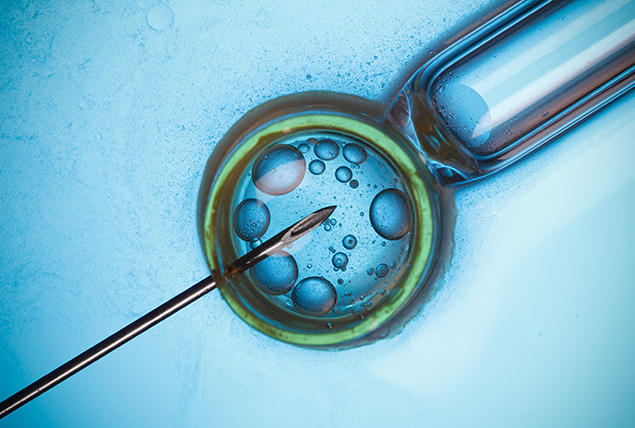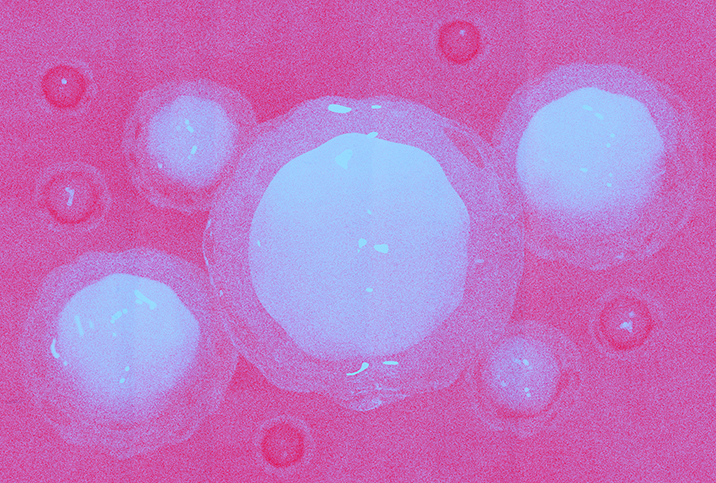If You Decide to Use IVF, Here's What Happens Next

If you're considering in vitro fertilization (IVF), there's a good chance you have some questions and maybe even some fears about the procedure.
Here are some details to know about how IVF is done and what to expect, including the potential risks and benefits.
How is IVF done?
IVF is a procedure where eggs are collected after the ovaries have been stimulated with hormonal medication to grow a group of eggs, explained Jennifer Kulp Makarov, M.D., a board-certified OB-GYN and reproductive endocrinology and infertility specialist at New Hope Fertility in New York City.
First, ovaries get stimulated with hormonal medication to grow a group of eggs. The amount of hormones depends on the type of IVF you are doing. There is even natural IVF, which uses no hormones and works with the body's natural ovulation, Makarov explained.
The eggs produced are collected with a transvaginal ultrasound, where the eggs are gently suctioned out of the ovaries. The eggs are taken to an embryology lab, where they are combined with sperm and fertilized. The fertilized eggs are grown in an embryology lab for up to a week, Makarov said. After the embryos have grown, they can be tested for genetic anomalies. After testing, the embryos are either transferred to a uterus or frozen for later use.
Risks of IVF
IVF risks depend on the type of IVF protocol that is done. There is conventional IVF, which uses a higher dosage of injectable hormones; mini IVF, which uses more natural hormones and about 75 percent less of injectable hormones; and there's natural IVF, where no hormones or injections are used, and the process tracks the body's natural ovulation, Makarov explained.
For conventional IVF protocol, there is a risk of ovarian hyperstimulation syndrome (OHSS), a temporary, exaggerated response to excess hormones causing the ovaries to swell and become painful, which usually goes away within two weeks. Since mini IVF uses 75 percent fewer hormones than conventional IVF, there is much less of a risk of OHSS with this procedure.
"In terms of long-term risk, we can be reassured that we have not seen an increase in breast or ovarian cancer after patients have undergone IVF treatment, in part, because the medication to stimulate the growth of the eggs are only taken for about a week and a half or 10 days," Makarov said.
IVF's high success rate
"IVF is the most successful type of fertility treatment available. We see the highest pregnancy rates after IVF," Makarov said.
However, the success rate of IVF does depend on the age of the patient.
"As you get older, it can take more egg retrieval cycles in order to get pregnant because age is such an important factor," Makarov said. "So we see the success rates go down for women over the age of 35 and more drastically for women ages 40 or over. It is important to be aware of the huge impact…age has on the success of IVF."
IVF can reduce the chance of a miscarriage
The process of IVF allows for the embryos to be genetically strained before pregnancy and screened for viability, which can reduce the chance of a miscarriage. IVF's ability to reduce the chance of miscarriage is beneficial and important to those patients prone to miscarriages, Makarov explained.
IVF can decrease the chance of genetic diseases
IVF embryos are screened for diseases such as Down syndrome, sickle cell disease and cystic fibrosis, which can be screened for again before pregnancy. If the patient is known to have a risk of these or other genetic diseases, this screening reduces the chances of the baby having one of these diseases, Makarov pointed out.
You don't need heavy doses of hormones with IVF
There's a common misconception that IVF involves pumping your body with heavy and high doses of hormone injections in order to get pregnant, but this is not always true.
"I do see a lot of patients who really needed IVF to get pregnant but were too hesitant to go through IVF, thinking the only way was to take very high-dose injections, but actually there are other ways," Makarov said. "There are more innovative protocols which use a lot of your body's natural hormones, which is actually what IVF injections are; they are synthetic hormones of the hormones your body makes naturally."
Newer IVF protocols use your body's natural hormones, reducing the number of heavy hormone injections you used to have to take during this process.
What are the long-term risks of IVF?
IVF has been around for more than 30 years, so if there were any long-term side effects, we would've seen them by now.
"We haven't seen long-term health risks for the [patients]," Makarov said.
There has not been evidence of increased rates of long-term side effects, such as ovarian or breast cancer, after IVF treatment because the patient is on medication for only a week to 10 days.
Are IVF pregnancies high risk?
"In terms of the pregnancies which result after IVF treatment, these are not considered to be high risk," Makarov said. "When you get pregnant through IVF, you can go to a regular OB-GYN and they can take care of you through the pregnancy and deliver your baby because the great majority of pregnancies conceived via IVF are not high risk."
How does IVF affect your baby?
The majority of babies born through IVF are born healthy, with a slight increase in low birth weight or premature birth.
"Overall, about 1 percent of babies are born with anomalies, and with IVF, it may slightly increase to 2 percent, [but these abnormalities] tend to be minor...the great majority conceived via IVF are born healthy," Makarov said.


















